As autumn sets in, commercial landscapes require unique care and attention to maintain their aesthetic and functional appeal. However, beyond appearances, sustainability has become a key priority for businesses looking to reduce their environmental footprint. With the changing season, fall offers an excellent opportunity for commercial landscapers to implement eco-friendly practices that promote sustainability while preserving the beauty of the landscape.
In British Columbia, IslandEarth Landscape Company is at the forefront of this shift toward greener, more sustainable landscaping solutions. They have successfully integrated sustainability into their commercial projects through thoughtful design, innovative techniques, and eco-conscious materials. This blog explores some of the key sustainable practices that businesses can adopt in fall landscaping, along with future trends in the field.
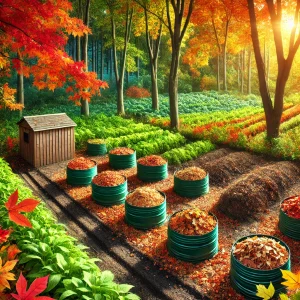
Composting for Soil Health
Composting is one of the most effective ways to recycle organic waste and improve soil quality. Fallen leaves, plant clippings, and organic debris from autumn can be transformed into nutrient-rich compost. Not only does composting reduce waste, but it also eliminates the need for synthetic fertilizers, which can hurt the environment.
IslandEarth Landscape Company has successfully incorporated composting into their fall maintenance routines for commercial landscapes. By setting up on-site composting systems, businesses can reduce waste disposal costs while enriching the soil. Healthy soil leads to healthier plants, which require less water and maintenance in the long run, creating a more resilient landscape.
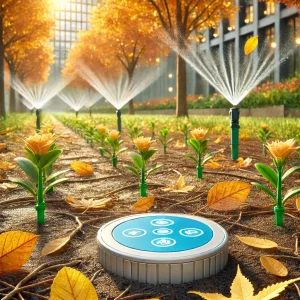
Water Conservation with Smart Irrigation Systems
Water conservation is critical to sustainable landscaping, especially during the cooler, wetter months of fall. Traditional irrigation methods often result in overwatering, leading to unnecessary water waste. However, smart irrigation systems with sensors and weather data can adapt watering schedules based on current conditions, ensuring that plants receive only the water they need.
IslandEarth has implemented smart irrigation solutions across various commercial properties in British Columbia, helping businesses optimize water usage. These systems contribute to sustainability efforts and reduce operational costs for businesses by lowering water bills. As a forward-thinking practice, integrating smart irrigation systems during the fall allows landscapes to thrive year-round with minimal water waste.
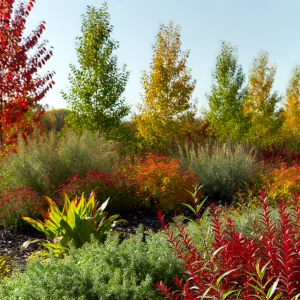
Native Plants for Biodiversity and Resilience
Choosing native plants is another sustainable landscaping technique that businesses can adopt. Native plants are well-adapted to the local climate, requiring less water, fertilizer, and maintenance than exotic species. They also play a critical role in supporting local biodiversity and providing pollinators, birds, and beneficial insects habitats.
In British Columbia, where the climate varies greatly, IslandEarth often recommends planting native species during the fall. Fall is an ideal time for establishing new plants because the cooler weather and increased rainfall reduce the stress on plants, allowing them to establish strong root systems. By promoting the use of native plants, commercial landscapes not only enhance their ecological value but also create vibrant, low-maintenance spaces that thrive year after year.
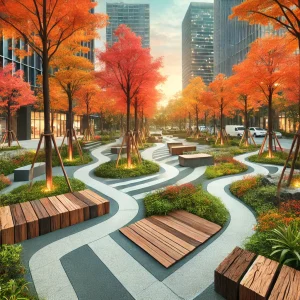
Recycled Materials in Landscape Construction
Another way to promote sustainability in fall landscaping is using recycled materials in construction projects. From recycled concrete for pathways to repurposed wood for garden features, businesses can reduce their environmental impact while creating functional and aesthetically pleasing landscapes.
IslandEarth has been a pioneer in using eco-friendly materials in its commercial projects. Whether it’s building retaining walls from recycled materials or crafting seating areas with reclaimed wood, these initiatives showcase how sustainability can be incorporated into every aspect of landscape design. Businesses that prioritize sustainability in their construction materials reduce waste and appeal to eco-conscious clients and customers.
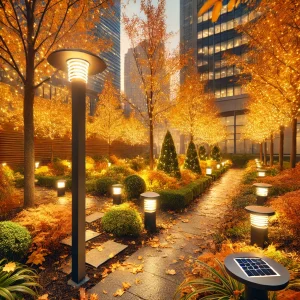
Solar-Powered Lighting Solutions
As the days grow shorter in fall, outdoor lighting becomes essential for maintaining the usability of commercial landscapes. Solar-powered lighting is an energy-efficient, eco-friendly solution that reduces electricity consumption and enhances safety and ambiance.
IslandEarth has introduced solar lighting systems in various commercial properties, particularly parking lots, pathways, and garden areas. These lights provide illumination and harness renewable energy, contributing to a business’s sustainability goals. Installing solar-powered lighting in the fall ensures that businesses are prepared for the longer nights of winter while lowering their carbon footprint.
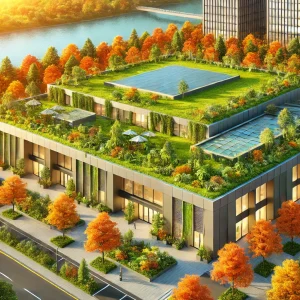
Future Trends in Sustainable Fall Landscaping
Looking ahead, the future of sustainable landscaping is likely to be shaped by technological advancements and an increasing focus on climate resilience. One emerging trend is using artificial intelligence (AI) to manage landscapes more efficiently. AI-powered tools can monitor plant health, predict maintenance needs, and optimize resource usage, reducing the environmental impact of landscaping practices.
Another promising trend is the integration of green roofs and living walls in commercial properties. These features not only enhance the landscape’s aesthetic value but also contribute to energy efficiency by insulating buildings and reducing heat absorption. As businesses become more aware of their environmental responsibilities, the demand for innovative, eco-friendly solutions is expected to grow.
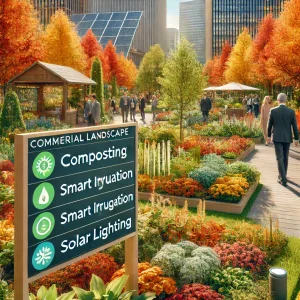
Marketing Sustainability to Clients and Communities
Businesses that invest in sustainable landscaping should market their efforts to clients, employees, and the wider community. Highlighting eco-friendly practices—whether through signage, marketing materials, or corporate social responsibility reports—can enhance a company’s reputation and demonstrate its commitment to sustainability.
IslandEarth has successfully helped businesses showcase their green initiatives by offering landscape tours or educational materials about their sustainable practices. These efforts enhance the brand’s image and engage the community in supporting environmentally friendly practices.
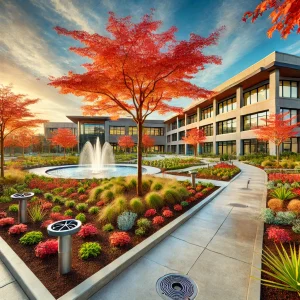
As businesses look to the future, sustainability must be a core consideration in landscaping practices. Fall is the perfect season to implement eco-friendly techniques such as composting, water conservation, planting native species, using recycled materials, and incorporating solar-powered lighting. By embracing these practices, businesses reduce their environmental footprint and create beautiful, resilient landscapes that stand out year-round.
With IslandEarth Landscape Company leading the charge in sustainable landscaping practices in British Columbia, commercial properties can align their outdoor spaces with their green goals. By adopting these sustainable practices, businesses can enhance their landscapes and reputation as environmentally conscious organizations.